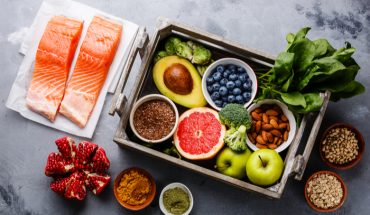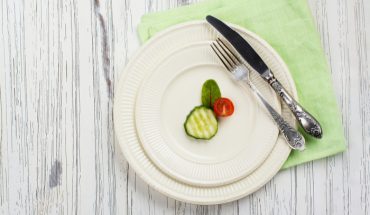Yo-yo dieting has one very obvious effect on skin – constantly losing and regaining weight can leave permanent stretch marks and sagging and drooping skin. ‘Of course, this depends on how much weight you gain and lose, how often and also your age and the elasticity of the skin, but it is a common issue,’ says Dr Nick Lowe, a consultant dermatologist based in London’s Harley Street and LA. So, older women with less elastic skin will be more prone to skin sagging. Quick weight gain followed by rapid weight loss also puts more strain on skin than gradual weight change.
Restrictive diets can also affect the appearance and plumpness of the skin. ‘Collagen is made from protein and hyaluronic acid so lack of protein in the diet may have an effect on collagen production, causing premature ageing and wrinkles,’ says Dr Lowe. B vitamins, water soluble vitamins which play an important role in skin health, are found in green vegetables, oily fish, chicken, turkey and nuts. ‘Lack of these vitamins can lead to inflammation in the skin, a breakdown of the protective skin barrier and poor skin quality. A lack of oily fish and iron in the diet may be linked to dry skin dermatitis.
Joanna Evans, an aesthetic therapist based in London, also says that binge eating can have a negative effect on the skin. ‘A diet high in fats and carbohydrates can alter hormone levels in the body, leading to higher production of sebum in the skin, causing breakouts and spots.’
Studies have shown that yo-yo dieting does seem to have an effect on bone density. A recent US study found that women whose weight fluctuated had increased bone resorption when their weight fell, which was not replaced when they regained the pounds. ‘The bottom line is that losing weight repeatedly is not good for bone health. It’s common sense to say that the more times you weight cycle, the more bone mass you lose,’ says Professor Lanham-New, professor of nutrition at the University of Surrey and a member of the Scientific Forum for the National Osteoporosis Society. Gaining weight does not lead to bone loss, but these ‘feasting’ periods do not make up for bone loss in the fasting times.
A 1997 study, also from US researchers, showed that obese women who were yo-yo dieters before the menopause had lower bone mineral densities than obese premenopausal women who were not weight cyclers.
Professor Lanhan-New is concerned that a generation of young female yo-yo dieters are setting themselves up for bone thinning problems in later life. ‘These periods of crash diets at an early age can mean that bones never reach peak bone mass at all. We also know that young women who don’t have the minimum amount of calcium (400mg a day for example), are at the highest risk of developing osteoporosis later on.’
- Biden Declines Second Term: Health Concerns - 23rd July 2024
- New catheter coating stops bacteria cells from swarming - 10th June 2024
- AI-designed catheters could dramatically reduce urinary tract infections - 10th June 2024







